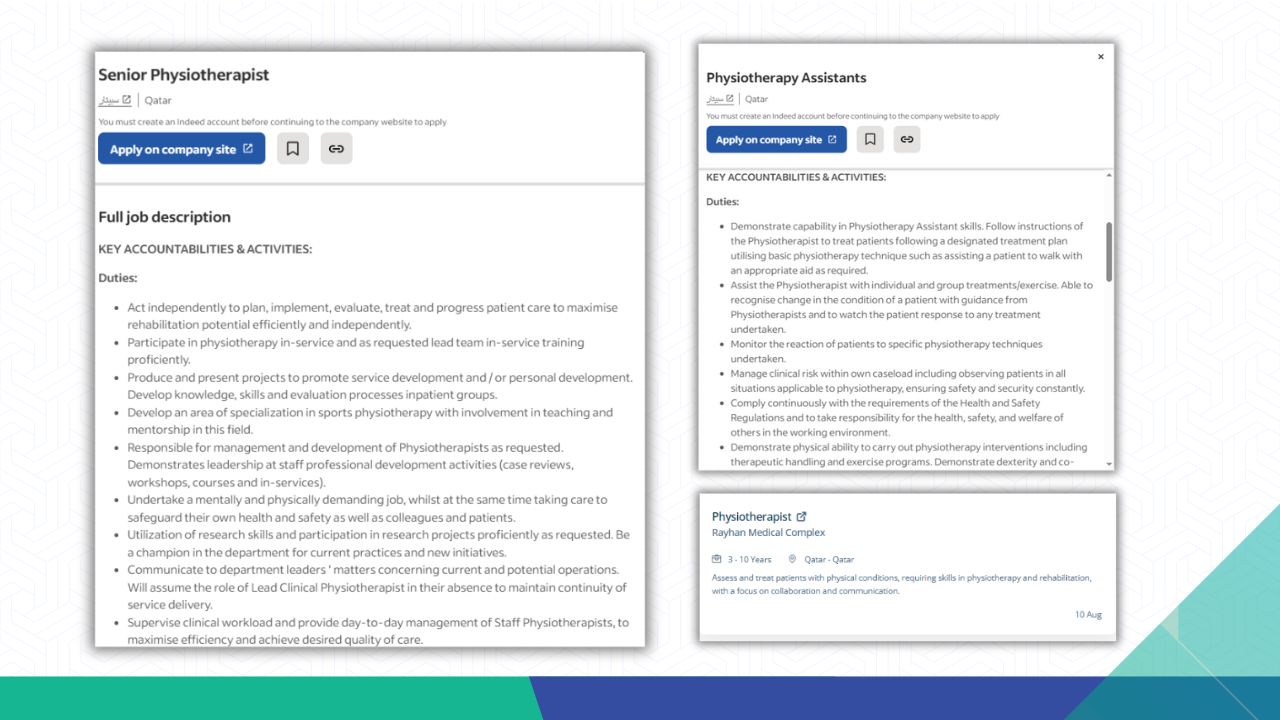Why Qatar for Physiotherapists?
Here, you get tax-free salaries, a world-class healthcare system, and huge demand in rehabilitation and sports medicine. For a physiotherapist, that means financial stability and global exposure at the same time.
Whether you are just graduating in India or you already have years of experience, Qatar has plenty of opportunities. You can work in hospitals, sports medicine centres, or rehabilitation clinics, but before you pack your bags. You need to know how the job market looks, what salaries to expect, how the licensing process works, and what kind of career growth is possible.
The Physiotherapy Job Market in Qatar
Qatar is investing in healthcare. The aim is to build a sustainable and modern healthcare system, and physiotherapy is a major part of that plan.
Why Physiotherapists are in Demand in Qatar:
- Sports medicine: Qatar has continued to invest in sports healthcare. More athletes mean more sports physiotherapists.
- Aging population: One of the most common factors is the ageing population, who need physiotherapy for their mobility and to ease the pain.
- Lifestyle diseases: Conditions like obesity, diabetes, and back or joint problems are common now, creating more demand for physical therapy.
- Healthcare expansion: Every year, new hospitals and clinics are opening up. Allied healthcare professionals are needed everywhere.
Physiotherapist Salaries in Qatar
Salary is a big reason why people look to work in Qatar. The tax-free income is a huge plus.
Average Salary Breakdown (2025)
| Experience Level | Average Monthly Salary |
| Entry-Level (0–3 years) | QAR 4K – 12K (INR 95K- 2.8L) |
| Mid-Level (4–6 years) | QAR 7K – 15K (INR 1.6 - 3.5L) |
| Senior-Level (10+ years) | QAR 15K+ (3.5L+) |
Extra Benefits You Get
- Free or subsidized housing
- Health insurance for you and your family
- Paid annual leave
- End-of-service gratuity at the end of the contract
Also Read: Physiotherapist Salary in Qatar
Career Opportunities for Physiotherapists in Qatar
Physiotherapists here don’t just work in hospitals. The scope is wide, allowing you to choose based on your area of interest.
- Hospitals & Clinics – Jobs in surgery recovery, orthopedics, and chronic illness care.
- Sports & Rehab centres – Demand is growing rapidly following Qatar’s increased focus on global sports.
- Community & Home Care – Elderly care and at-home rehab services are becoming popular.
- Private Practice – You can even run your own practice or conduct home visits.
Types of Jobs Physiotherapists Do in Qatar
Your work depends on the setting and specialization. Here are some roles you might find yourself in:
- Hospital Physiotherapist – works in hospitals with patients recovering from injury or surgery.
- Sports Physiotherapist – supports athletes, clubs, and national teams with injury prevention and recovery.
- Pediatric Physiotherapist – works with children who have mobility issues or developmental delays.
- Orthopedic Physiotherapist – focuses on bone, joint, and muscle rehab.
- Neurological Physiotherapist – helps patients after stroke, spinal injuries, etc.
- Community / Home Care Physiotherapist – provides therapy at patients’ homes, often for elderly or post-surgery patients.
- Rehabilitation Specialist – works with teams of doctors, nurses, and therapists for long-term recovery plans.

QCHP Licensing for Physiotherapists
Before you can start working, you need a license from the Qatar Council for Healthcare Practitioners (QCHP).
How the Licensing Works
- You must have a bachelor’s degree in physiotherapy
- At least 2 years of work experience
- Your documents are verified through Dataflow.
- Clear the QCHP exam
- Once approved, you can legally work in Qatar
Pro tip: Preparing with mock exams and structured coaching helps a lot. It increases the chance of passing the QCHP exam on the first try.
Career Growth in Qatar
Working in Qatar isn’t just about good pay. It is also about long-term career building.
- Specializations – You can move into orthopedics, sports, pediatrics, neurology.
- Employer support – Many hospitals sponsor advanced training and certifications.
- Networking – Work with professionals from around the world and build global contacts.
- Recognition – Experience in Qatar is respected across the Gulf and beyond.
Why Qatar is the Right Move in 2025
Qatar offers the perfect mix of money, modern healthcare, and growth opportunities. Physiotherapists here get good pay, tax-free benefits, and access to state-of-the-art facilities.
Physiotherapy jobs in Qatar are more than just jobs, they are a gateway to higher income, professional recognition, and global exposure. From modern hospitals to sports clinics and community care, the opportunities are wide and growing every year.
If you prepare well for the QCHP exam and focus on high-demand areas like sports or pediatric care, you can secure not just employment but a career that is financially stable and internationally respected.
So if you’re planning to take your physiotherapy career abroad, Qatar in 2025 is one of the smartest choices you can make.